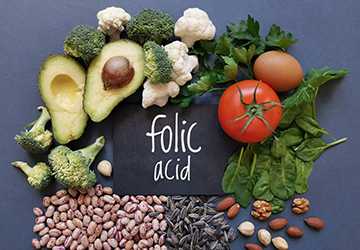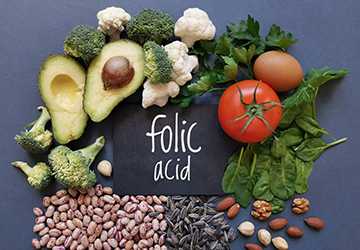7 Reasons You Should Prioritize Folate Intake During Pregnancy
Are you pregnant? If so, you may wonder why everyone tells you to eat more folic acid, a B vitamin essential for developing your baby's brain and nervous system.
According to the Centers for Disease Control and Prevention (CDC), nearly half of pregnant women in the United States do not consume enough folic acid; this is concerning because folic acid is most important early in pregnancy, and many women may not even know they are pregnant.

This blog post discusses seven reasons why folic acid should be a priority during pregnancy. Read on to learn more.
Seven Reasons Why Folic Acid Should be a Priority During Pregnancy
As we break down the top seven reasons to prioritize folic acid, remember that each one plays a vital role in your and your baby's health. So, let's examine and interpret these findings one by one.
1. Folic acid helps prevent congenital disabilities
Folic acid is required for the normal development of the neural tube (the precursor of the spinal cord and brain).
If the neural tube does not develop properly, congenital disabilities such as spina bifida and anencephaly may occur.
Studies show that taking 400 mcg of folic acid daily before and during pregnancy can reduce the risk of spina bifida by up to 70%.
2. Folic acid is essential for brain development
Folic acid is also crucial for your baby's brain development. Folic acid helps produce myelin, a substance that insulates nerves in the brain. Myelin is necessary for proper signal transmission between nerve cells.
Research shows that babies whose mothers don't get enough folate during pregnancy are more likely to have cognitive problems later in life.
Adequate folic acid intake during pregnancy can help your baby's brain develop properly, improving cognitive function, memory and learning later in life.
3. Folic acid can reduce the risk of premature birth and low birth weight
Birth before the 37th week of pregnancy is considered premature. Low birth weight primarily refers to a weight of less than 5 pounds or 8 ounces.
Folic acid can help reduce the risk of premature birth and low birth weight by improving placental function. The placenta is the organ used to transfer nutrients and oxygen from mother to baby.
By improving placental function, folic acid can help ensure your baby gets the nutrients he needs for average growth and development.
4. Folic acid may help reduce the risk of pregnancy complications
Not only does it prevent congenital disabilities, but it also reduces the risk of premature birth and even low birth weight.

Folic acid may also help reduce the risk of other pregnancy complications, such as preeclampsia and gestational diabetes. These diseases are dangerous for both mother and baby.
Folic acid is thought to help reduce the risk of these diseases by improving blood vessel function and reducing inflammation.
5. Folic acid is essential for your health
Folic acid is not only crucial for your baby's health but also for your health. Folic acid helps produce red blood cells, which carry oxygen to body tissues.
Folic acid also helps prevent anaemia, which is when your body doesn't have an adequate supply of healthy red blood cells.
Getting enough folic acid during pregnancy can help you stay healthy and have enough energy to meet the demands of pregnancy.
6. Folic acid is easy to obtain
Folic acid is found in many foods, including green leafy vegetables, fruits, legumes and fortified cereals. You can also get folate from prenatal vitamins.
The CDC recommends that all pregnant women consume 400 micrograms of folic acid daily. You can get this much folate by eating a healthy diet and taking prenatal vitamins.
Here are some tips for getting enough folate:
● Eat enough green leafy vegetables, including spinach, kale, and kale.
● Eat more fruits such as oranges, berries and bananas.
● Eat beans and lentils.
● Choose fortified cereals and breads.
● Take vitamins before birth.
Eat folate-rich foods or supplements as your doctor recommends to support your baby's health.
7. Folic acid is affordable
Folic acid is a relatively affordable nutrient. You can get folate from many foods that are cheap and easy to find. Prenatal vitamins are also relatively inexpensive.
Here are some tips to save money on folic acid:
● Buy green leafy vegetables in bulk and freeze them for later use.
● Choose frozen or canned fruit over fresh fruit when on sale.
● Buy dried beans and lentils and cook them at home rather than buying canned beans and lentils.
● Look for coupons and discounts on prenatal vitamins.
Remember, prevention is crucial, and folic acid can significantly help. Make it a non-negotiable part of your prenatal routine.
Conclusion
Folic acid is vital for pregnant women. It is essential for the development of your baby's brain and nervous system and can also help prevent congenital disabilities such as spina bifida and anencephaly.
The best way to get enough folate during pregnancy is to eat a healthy diet and take prenatal vitamins.
Folic acid is found in many foods, including green leafy vegetables, fruits, legumes and fortified cereals. Prenatal vitamins are also relatively inexpensive.
If you are pregnant or planning to become pregnant, taking folic acid should be a priority. It is one of the best things you can do for your baby's health and your own.





